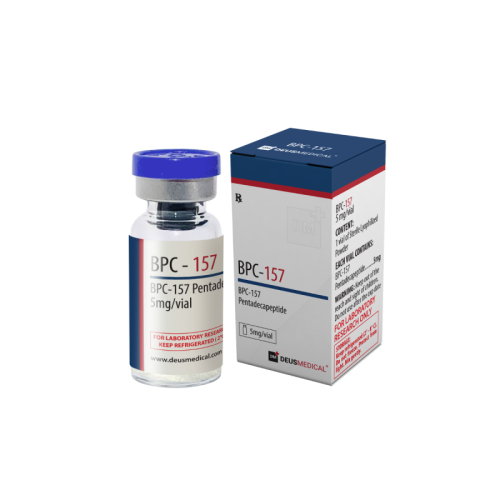CLASSIFICATION
Polypeptides
ACNE
No
WATER RETENTION
No
HBR
No
HEPATOTOXICITY
No
AROMATIZATION
No
MANUFACTURER
Deus Medical
WAREHOUSE
EU Warehouse 2
SUBSTANCE
BPC-157 Pentadecapeptide
,
BPC-157 is a synthetic peptide composed of 15 amino acids that does not occur naturally, but it is derived from a peptide known for its protective role in the stomach. Many individuals utilize it to aid in the recovery from myotendinous injuries. This peptide enhances the regeneration of muscles and tendons by promoting angiogenesis, the process of forming new blood vessels, which accounts for its regenerative capabilities and potential to assist in wound healing, cuts, and other types of damage.
By increasing the formation of new blood vessels, BPC-157 may be beneficial for those suffering from Inflammatory Bowel Diseases (IBD), where the healing of the intestinal lining is hampered by inflammation. Furthermore, it may facilitate wound and tendon healing by inhibiting the effects of a particular molecule known as 4-hydroxynonenal, which can inhibit growth.
Additionally, BPC-157 might aid tendon repair by encouraging tendon cells to produce more receptors for certain growth factors, enabling these cells to proliferate during the injury recovery process, thus expediting healing. It also has anti-inflammatory properties, which likely contribute to its positive effects on wounds, ulcers, and tissue protection.
Moreover, BPC-157 can affect neurotransmitter activity, including serotonin and dopamine, potentially aiding in the treatment of depressive disorders and chronic pain. It also boosts nitric oxide (NO) production, which can help reduce blood pressure.
Lastly, BPC-157 appears to accelerate the growth and spread of fibroblasts, a specific type of connective tissue cell found in skin, tendons, and other body structures, which may be advantageous for joint injuries.
USAGE:It can be taken orally or via injection, with many users preferring injections for muscle injuries and oral administration for digestive health. The recommended human equivalent dose is approximately 1.6 mcg/kg of body weight per day, though a dose of 5.4 mcg/kg per day is generally suggested for a duration of at least two weeks.

